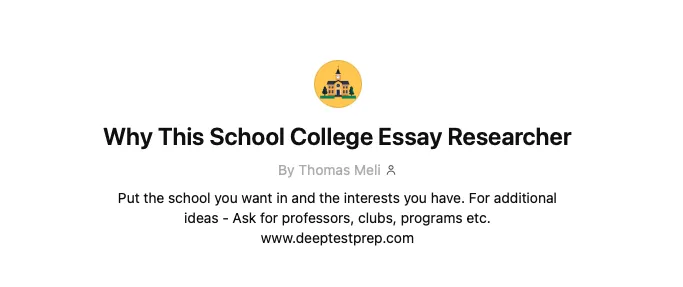Introduction
Writing the “Why This School?” essay often feels overwhelming because you need to demonstrate both specific knowledge of a college’s offerings and a clear vision for how you’ll use them. That’s why I developed the “Why This School” College Essay Researcher GPT: to help you find detailed information in minutes and craft a focused, evidence-based essay.
Key Takeaway: By leveraging this GPT tool, you can reduce the time spent on school-specific research by up to 80% and instead focus on weaving compelling stories and personal reflections into your essay.
Common Pitfalls and How to Avoid Them
Before diving into specific strategies, let’s spotlight a few mistakes that often trip students up. Keep these pitfalls in mind as you plan and write your essay, and consider how GPT can help you avoid them.
Pitfall 1: Overly Vague Statements
Pitfall: “I love that Georgetown has a strong community.”
Why it matters: Without an example of an actual club or tradition that interests
you, admissions officers may doubt your sincerity.
Corrective Approach: Reference a specific initiative (e.g., a peer mentorship program, a community service group) to demonstrate that you’ve done your homework and know why it resonates with you.
Pitfall 2: Listing Without Reflection
Pitfall: “They have X program, Y course, Z club.”
Why it matters: Merely listing resources can come across as superficial.
Corrective Approach: After mentioning each resource, explain how it aligns with your past experiences or future plans. Demonstrate genuine interest by reflecting on your goals and connecting them explicitly to that resource.
Pitfall 3: Ignoring the School’s Culture
Pitfall: Focusing solely on courses or majors without acknowledging campus ethos or values.
Why it matters: Schools are communities with unique missions and values.
Corrective Approach: If a school emphasizes leadership or service, for example, highlight an experience that shows your alignment with that cultural priority.
Pitfall 4: Not Researching Unique Programs or Faculty
Pitfall: Mentioning the college name without referencing any unique academic or
extracurricular offerings.
Why it matters: Generic references tell an admissions officer nothing about how
you’ll engage on their campus.
Corrective Approach: If you’re interested in law, discover which professors are recognized for groundbreaking legal research. Show how their focus complements your experiences or aspirations.
Laying the Foundation
Begin by typing the college name and your academic or career interests into the GPT to get 5
to 10 relevant programs, faculty names, and research centers.
This gives you an immediate snapshot of a school’s unique offerings. For example, “Georgetown University.
I’m interested in law, public policy, and social justice.”
Time Saved: By consolidating your initial research into a single prompt, you
can spend 30-80% less time combing through multiple web pages and instead focus
on making meaningful connections.
Example: Initial Prompt
Before: “I want to attend Georgetown for its great programs.”
After: “I’m eager to engage with the Georgetown Center for the Constitution, where I can explore how constitutional law shapes public policy. This connects directly to my internship at a local nonprofit advocating for legislative reform.”
Why GPT Helps Here: It quickly compiles facts you might otherwise miss, like notable faculty, specialized labs, or academic centers relevant to your goals.
Digging Deeper with Follow-Up Questions
Avoid surface-level facts like “prestigious law school” or “excellent resources”; go deeper
by asking GPT for specifics about professors, research centers, or unique organizations.
Consider prompts such as, “Which professors at Georgetown focus on constitutional law?” or “What
public policy research centers are available for undergraduates?”
How Much Depth?: Aim for at least 3-5 detailed pieces of information
that not only mention campus resources but also hint at how you’ll engage with them.
Example: Probing for Details
Prompt: “Are there student organizations that focus on legal advocacy at Georgetown?”
GPT Suggestion: “Yes, there’s the Equal Justice Foundation, which funds student work in public interest law, and the Undergraduate Law Review Society, where students can publish legal research and case analyses.”
Takeaway: Instead of saying “strong legal advocacy programs,” you can show you’ve done the legwork by naming a specific group and explaining why it matters to you.
Personalizing Your Research
Your essay should make it clear why these features matter to you—link them to your work, volunteer experiences, or family background. Colleges want to see that you’ve considered how these resources fit your future path.
Concrete Example
Before: “I’m excited about Georgetown’s law programs.”
After: “I’m eager to engage with the Georgetown Center for the Constitution, where I can explore how constitutional law shapes public policy. This aligns with my internship at a local nonprofit advocating for legislative reform and my long-term goal of becoming a civil rights attorney.”
Tip: Even if you haven’t done an internship, you can still reflect on class projects, volunteer experiences, or personal challenges that illuminate why a particular program calls to you.
Generating Drafts with ChatGPT
Asking GPT for paragraphs or outlines can reduce writer’s block by about 50%. You might say, “Write a paragraph about how Georgetown’s Center for the Constitution connects to my interest in constitutional law.” Generate multiple variations, then refine them to match your own style.
Example: Drafting Paragraphs
Prompt to GPT: “Write a paragraph explaining how my internship at a legislative reform nonprofit ties into Georgetown’s constitutional law focus.”
Generated Snippet: “The opportunity to delve into policy advocacy at the Georgetown Center for the Constitution directly complements my prior experience at a local nonprofit advocating for legislative reform…”
Practical Advice: Don’t just copy and paste. Use these AI-generated paragraphs as raw material—then edit to ensure it reflects your personality and resonates with your genuine goals.
Balancing Academics with Personal Growth
Admissions officers want to know both how you’ll thrive academically and how you’ll fit into campus culture. If a college has a strong emphasis on service, share an anecdote that shows your passion for community work.
Example: Cultural Fit
Before: “I love that Georgetown cares about service.”
After: “Georgetown’s Jesuit commitment to social justice aligns with my dedication to legal advocacy, offering opportunities to engage in service-learning through the Justice and Peace Studies program.”
Final Refinements and Authentic Voice
The GPT’s draft text might sound generic, so review each paragraph to ensure it reflects your authentic voice and experiences. Be direct in tying program names, faculty interests, or campus traditions back to your personal aspirations. If you’re aiming for a career in public policy, for instance, highlight how a particular research institute or professor’s work is crucial to your growth.
Pro Tip: Think about transitions. After introducing a resource, start the next sentence with a personal reflection. For example, “This focus on global health resonates with me because of my experience volunteering at a free clinic.”
Finally, read your essay out loud. If it sounds like you—conversational and authentic—then you’ve found the right balance between research and personal storytelling.
Why This GPT Makes the Essay Easier
Before this tool, students often spent several hours sifting through multiple pages on a college’s website. The “Why This School” College Essay Researcher GPT allows you to:
- Save Time: Gather specific details in minutes instead of hours.
- Stay Focused: Identify 5 to 10 relevant facts or programs that align with your goals.
- Show Genuine Interest: Craft paragraphs that demonstrate real engagement with the school’s offerings.
Example of Specific, Targeted Writing:
“I’m eager to engage with the Georgetown Center for the Constitution, where I can explore how constitutional
law shapes public policy. This aligns with my nonprofit work advocating for local legislative reform
and my long-term goal of becoming a civil rights attorney.”
Note: This approach shows the admissions team how you’ll make the most of their resources, distinguishing you from those who submit overly general, one-size-fits-all essays.
Final Thoughts
The “Why This School” College Essay Researcher GPT is designed to give you a running start on a persuasive, well-researched essay. It uncovers details you might not find immediately on the college website, but your voice and experiences ultimately make the difference. Remember to edit thoroughly, ensuring every sentence feels personal and relevant to your specific goals.
Ready to see how it simplifies your process? Start here. By pairing intentional planning with reflection, you can craft a “Why This School?” essay that distinguishes you in a competitive admissions landscape. Good luck!





